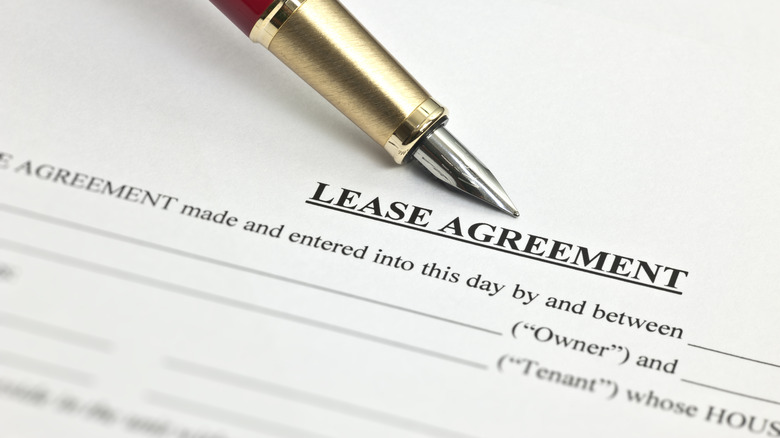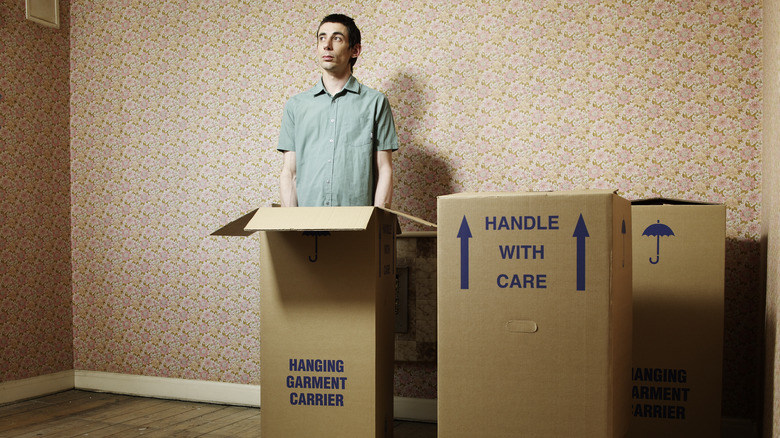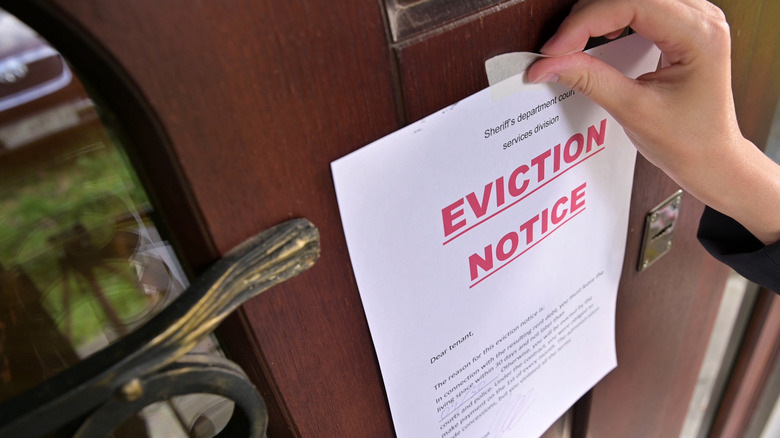Here's What Happens When You Can't Make Rent (& How To Deal With It)
Budgetary math doesn't always neatly add up. For those living paycheck to paycheck — about 65% of the country— making rent consistently might require scrounging in another area from time to time. When emergencies arise or hours at work take a hit, even the rent might become difficult or impossible to keep afloat. In the summer of 2022, 15% of Americans renting their home were behind on payments. That equates to roughly 8 million people.
For many who face financial difficulties, working with your landlord to manage the short-term belt-tightening requires a tough conversation and a mutually constructed plan to make up the deficit over a longer period. However, this won't always be the case: Some landlords will naturally become irate about the shortfall, opting for a more punitive approach. No matter your circumstance, the path forward when you can't make rent is clear. Open dialogue, honesty, and an understanding of what can and may take place in terms of augmented arrangements and potential consequences dominate this time of turmoil.
What happens if you don't pay your rent
If you don't pay your rent, ultimately you'll find yourself dealing with at least one of many potential consequences. Your landlord may be receptive to alternative arrangements, leading to a somewhat awkward conversation but little else. You may be forced to pay a penalty fee on top of the late rent payment, making your housing costs a little higher. While amounting to an unacceptable course of action, you may be harassed, threatened, or otherwise abused by your landlord.
The worst-case scenario will see you heading to eviction court, where you'll plead your case. If you fail to appear, a judgment can be rendered against you by default — although this hinges on the proper eviction procedures taking place in the lead-up to your court date. It's important to remember that if you are late or fail to pay your rent, you have acted improperly and will have to face the consequences. These may be large or small, but getting ahead of the problem and working directly with your landlord to manage the issue is the best course of action.
Plan ahead and reread your lease
As soon as you identify potential issues in paying your rent, the first step you'll need to take involves research. Before doing anything else, break out your lease agreement and read through it thoroughly. Renters have a legal obligation to pay their rent on time and in full. However, your lease agreement may include language about what procedures your landlord will follow if you are late or completely miss a payment. Some leases include language about penalty fees or even added interest when making late payments, and others will go so far as to offer up details on the eviction process that might follow a missed payment. If there is no way around the harsh reality of missing a rent payment, you'll need to be open and honest with your landlord about your situation. But before you can try to negotiate or offer assurances about the future, take stock of any additional features of your lease that deal specifically with this scenario.
Knowledge is key to making it through the hard times that come as a result of rent difficulties. Without knowing where you stand it's impossible to draw up a road map for recovery.
Speak with your landlord about the situation
Once you understand the language in your lease agreement surrounding missed rent payments, you'll need to immediately contact your landlord and let them know what you are dealing with. Ideally, you'll be able to speak with your landlord the same day that you realize a budget discrepancy that will leave you short. The sooner you speak with your landlord the better your position will be, generally speaking. On the other hand, you absolutely shouldn't wait to contact your landlord until after you've missed a payment. As well, blanking them and waiting for contact to come your way is an even worse idea. Idle hands often make trouble, and if you leave your landlord to piece together the situation without input or context from your side then they are more likely to come to you in anger and perhaps even spite.
Everyone falls on hard times occasionally, and if you've experienced some kind of setback that prevents you from paying rent then the best thing you can do is reach out to your landlord and talk. This may be a long-term change in your workplace circumstances and salary, or it may result from a temporary setback spurred on by an emergency. Either way, talking through the issue with your landlord keeps them in the loop and reduces animosity and the potential for hasty and perhaps irrevocable decision-making.
Be prepared to receive a written warning or notice
Regardless of what your landlord says during a conversation about your issues, you should be prepared to receive a written notice that you've missed payment and may be evicted. In many states, landlords must provide this notice before going to an eviction court to seek legal help. As a result, your landlord may initiate this chain of events as early as possible to prevent a delay in removing you from the home if it ultimately comes to this.
After speaking with your landlord, it may become clear to everyone involved that your rent is only going to be a few days late. You may even come to an alternative arrangement or skip a payment and then make up for it with additions to future rent installments. Even so, by missing a payment, you will have breached your landlord's trust. They may not wish to wait to begin this process as a contingency in the event that your explanation or alternative payment plans ultimately fall short. Therefore, getting the ball rolling on legal requirements that precede taking the case to eviction court may occur even with arrangements in place. If you receive this kind of notice you shouldn't be alarmed — unless, of course, you opted not to speak with your landlord about the difficulties you are facing.
If you aren't responsive or still can't pay rent, you may be evicted
An eviction is a landlord's next step in getting rid of a tenant who isn't paying up. Landlords will want to collect any back rent owed to them, but the priority is removing a non-paying tenant from the home. If you become unresponsive after failing to make rent, miss milestones in a repayment agreement, or fail to pay future rent, eviction is likely the next course of action. If you are unable to pay your rent for an extended period, then you'll need to come to grips with the eventuality of losing your home.
Even with this looming overhead, a renter who is behind on payments can't afford to break off contact with their landlord. You must maintain an open dialogue so that both of you know where the other stands. In the event of an emergency or another temporary hardship, landlords may often be willing to informally work with their tenants rather than seeking legal help to remove or impose some kind of sanction on them. This is especially true for people who have not had issues in the past and take good care of the property. Even if you're unable to pay your rent for a time, remaining a responsible tenant in every other regard will stand for you as you seek to navigate these issues.
There are alternatives to this path: Start by speaking with a housing counselor
It's worth pointing out that there are alternatives available for tenants struggling to make rent. The housing market isn't simply a place where you pay up or you lose your home. The first step to looking for alternative support is to speak with a HUD-approved housing counseling agency. These organizations can help you understand your rights and illuminate any potential assistance programs that may be available to you. Rent assistance, for instance, may help bridge the gap financially between your current hardship and a future that sees you back on your feet. With financial assistance through government aid programs, you may not need to give up your home as you work through a major financial trauma.
As well, landlords are often cordial with their tenants, but this can change in an instant when a problem like this arises. You'll need to remember that by failing to pay rent you are in the wrong, but this doesn't give your landlord the right to walk in on you, change the locks, turn off utility services, or engage in any other abusive or harassing behaviors. Understanding your rights, responsibilities, and potential avenues of assistance can minimize the consequences of this situation substantially.
Seek out your own emergency assistance options
In addition to working with a housing counseling service, you'll need to research your own emergency assistance options. You shouldn't just rely on a counselor or anyone else to pave the way forward for you. Doing your homework on what sort of assistance might be out there to help you and your individual circumstances is a crucial step in the right direction.
Services like your local Salvation Army chapter, Modest Needs, church, and other religious groups in your area can be an outlet for grant funding to help you become current on your rent in the event of a short-term emergency. These and other local charities work with all kinds of people facing dire times, and your best bet when hoping to keep your home and make ends meet is to approach every charity organization that you can find. When times get tough, you'll need to get creative and scrap to survive. It's entirely possible to weather a small but powerful storm like this. But the universe helps those who help themselves and casts aside those who hope for a miracle and fail to act.
Consider other stopgap measures
In addition to seeking federal assistance or grants from local charities, anyone facing a housing crisis and a potential eviction should speak with friends or family about future support and perhaps even stopgap financial help. If you are evicted, you and anyone you share a home with will require an alternative place to lay your head. Therefore, finding someone to take you in for the time being should be high on your list of priorities. Alternatively, you may be successful in securing a loan from a loved one to cover the rent for the time being.
For those experiencing more prolonged money problems, other measures will be required. You might consider subletting a room in your home or apartment to reduce the expense you are personally responsible for. This can drastically change the amount of money you're required to contribute toward the property every month, potentially stemming the tide of this looming crisis. Bringing in a new roommate is a strategy best deployed before you miss a payment, however, and should therefore be used as a proactive tool. You might also consider a heart-to-heart with your landlord. If it's become clear that you won't make rent and aren't going to be able to afford it moving forward, you and your landlord might be able to agree on mutually parting ways without an eviction tainting your record and putting them in a financial bind in the meantime.
Fall back on credit cards, lending options, and investment liquidation
While a cash advance or personal loan isn't likely to act as a viable means of long term stability if you're facing an extended financial crisis, these can be weapons of last resort. These drastic money decisions can create a backstop to manage short-term rent issues but will be felt later on. If you find yourself in a particularly vulnerable pickle, a personal loan, cash advance, or any other sort of stopgap lending product might help you get through the crisis. This isn't a good strategy for managing routine budgeting issues, however, and will quickly erode your financial stability if this fallback becomes a habit.
Other acts of desperation that can be effective include the sale of investment assets. However, not all investments are created equal and retirement accounts should virtually always remain off limits. A tax-advantaged retirement account will generally include penalties for early withdrawals, not to mention the decimation of your retirement savings. Selling regular stock assets could help secure a lifeline in the short to moderate term, however. With this approach, you'll want to be careful about what you choose to sell to fund your immediate needs. Any stocks you've owned for less than a year will be subject to short-term capital gains taxes, dramatically increasing Uncle Sam's cut of your profits.
Don't lie or use deceitful tactics to stave off a confrontation
In addition to keeping an open dialogue with your landlord, it's critically important to stay honest and sincere in your conversations. As well, it's always to your benefit to keep correspondence in written format. There's nothing inherently wrong with talking on the phone, but if there's a discrepancy later on it can't be easily remedied by looking back over the paper trail. If you agree to pay this month's rent added into the next three payments, for instance, you'll want to get that arrangement codified in writing.
Regardless of how you conduct most of your interactions, one thing that must remain a priority is honesty. By missing a payment you've already breached the relationship's trust and failed to uphold your legal obligation. At this point, rebuilding trust and fixing the relationship is only second in importance to paying the rent and staying in your home. If you lie or even fudge the truth just a bit when negotiating, your landlord is far more likely to take a harsher stance with you and perhaps even change course and seek to remove you from the home after opting initially to work with you. The worst thing you can do in this situation is double down on the breach of trust that's been created.
How to avoid missing rent payments in the future
Financial emergencies will happen to everyone at some point. All kinds of unexpected setbacks, crises, and surprises are thrown people's way on a daily basis. Sometimes these troubles come with a hefty price tag, throwing a budget into chaos. If you've found yourself unable to pay rent, whether you ultimately manage to stay in the home or not the next step on your to-do list should be to create an emergency fund. As you work to recover from prior turmoil, one feature that should factor heavily into your thinking is the creation of a cash reserve that can help buoy you through any future difficulties.
Experts suggest that a fully funded emergency reserve should be able to cover three to six months of regular expenses. This means bills like your electricity and water services, internet and phone connections, food and toiletries, and of course your rent payments. Everyone's magic number will be different when it comes to creating emergency savings, but getting started with an intermediate goal is the first step to creating this buffer for anyone who doesn't have emergency cash set aside. Start with a goal of a couple hundred dollars and work up from there. Once you begin to set money aside it will become easier to snowball this fund until it reaches a sizable balance that can deliver you through future financial struggles.
If you do plan to simply squat in the home, things will become tense quickly
Finally, while it's virtually never advisable, some tenants will indeed squat in a landlord's home, without paying rent, for as long as possible. Eventually, the eviction process will catch up to you and you'll be forcibly removed from the home if you choose this path. Rogue tenants can buy themselves a few weeks or months in the property by electing to simply stay until the bitter end. Generally, eviction proceedings take one to three months from filing to removal, but this can vary by jurisdiction and according to many other circumstances. The result is a small window of relative quiet in a sea of chaos.
Ideally, you'll never even consider resorting to this option. Even though an eviction proceeding might provide a bit of time in the property, this judgment will weigh heavily against your ability to rent another home for many years to come. Similarly, your landlord will almost certainly seek to recover rent owed for the period you lived in the property, and perhaps even court or attorney's fees and additional damages. This means that you may be on the hook for added payments after the fact, enforceable by court order. For those experiencing the most desperate circumstances imaginable, this might be an option to bridge the gap and avoid having nowhere to go. However, simply waiting out the clock on an eviction is a losing battle and often brings along extreme distress and many future consequences.












